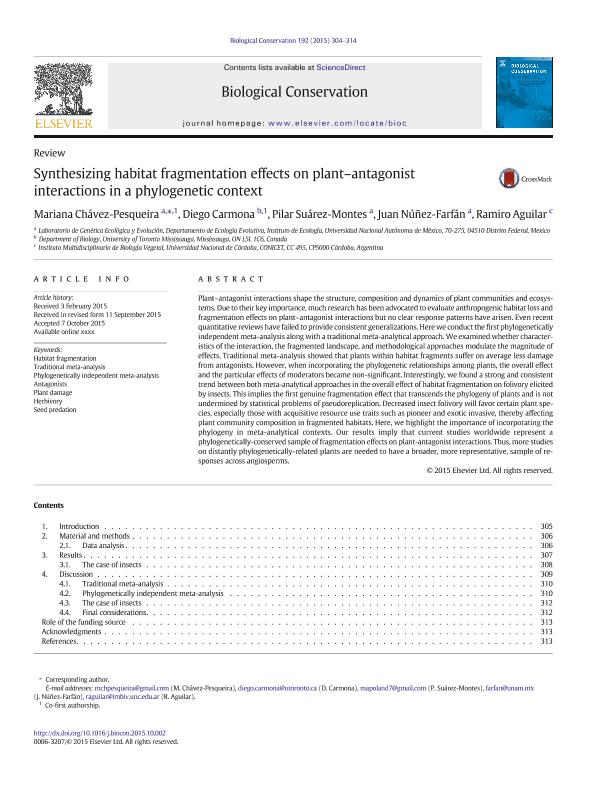Mostrar el registro sencillo del ítem
dc.contributor.author
Chavez Pesqueira, Mariana
dc.contributor.author
Carmona, Diego
dc.contributor.author
Suarez Montes, Pilar
dc.contributor.author
Núñez Farfán, Juan
dc.contributor.author
Aguilar, Ramiro

dc.date.available
2017-02-07T17:00:18Z
dc.date.issued
2015-10
dc.identifier.citation
Chavez Pesqueira, Mariana ; Carmona, Diego; Suarez Montes, Pilar; Núñez Farfán, Juan; Aguilar, Ramiro; Synthesizing habitat fragmentation effects on plant-antagonist interactions in a phylogenetic context; Elsevier; Biological Conservation; 192; 10-2015; 304-314
dc.identifier.issn
0006-3207
dc.identifier.uri
http://hdl.handle.net/11336/12638
dc.description.abstract
Plant-antagonist interactions shape the structure, composition and dynamics of plant communities and ecosystems. Due to their key importance, much research has been advocated to evaluate anthropogenic habitat loss and fragmentation effects on plant-antagonist interactions but no clear response patterns have arisen. Even recent quantitative reviews have failed to provide consistent generalizations. Here we conduct the first phylogenetically independent meta-analysis along with a traditional meta-analytical approach. We examined whether characteristics of the interaction, the fragmented landscape, and methodological approaches modulate the magnitude of effects. Traditional meta-analysis showed that plants within habitat fragments suffer on average less damage from antagonists. However, when incorporating the phylogenetic relationships among plants, the overall effect and the particular effects of moderators became non-significant. Interestingly, we found a strong and consistent trend between both meta-analytical approaches in the overall effect of habitat fragmentation on folivory elicited by insects. This implies the first genuine fragmentation effect that transcends the phylogeny of plants and is not undermined by statistical problems of pseudoreplication. Decreased insect folivory will favor certain plant species, especially those with acquisitive resource use traits such as pioneer and exotic invasive, thereby affecting plant community composition in fragmented habitats. Here, we highlight the importance of incorporating the phylogeny in meta-analytical contexts. Our results imply that current studies worldwide represent a phylogenetically-conserved sample of fragmentation effects on plant-antagonist interactions. Thus, more studies on distantly phylogenetically-related plants are needed to have a broader, more representative, sample of responses across angiosperms.
dc.format
application/pdf
dc.language.iso
eng
dc.publisher
Elsevier

dc.rights
info:eu-repo/semantics/openAccess
dc.rights.uri
https://creativecommons.org/licenses/by-nc-nd/2.5/ar/
dc.subject
Habitat Fragmentation
dc.subject
Herbivory
dc.subject
Seed Predation
dc.subject
Phylogenetically Independent Meta-Analysis
dc.subject.classification
Conservación de la Biodiversidad

dc.subject.classification
Ciencias Biológicas

dc.subject.classification
CIENCIAS NATURALES Y EXACTAS

dc.title
Synthesizing habitat fragmentation effects on plant-antagonist interactions in a phylogenetic context
dc.type
info:eu-repo/semantics/article
dc.type
info:ar-repo/semantics/artículo
dc.type
info:eu-repo/semantics/publishedVersion
dc.date.updated
2017-01-31T17:46:48Z
dc.journal.volume
192
dc.journal.pagination
304-314
dc.journal.pais
Países Bajos

dc.journal.ciudad
Amsterdam
dc.description.fil
Fil: Chavez Pesqueira, Mariana . Universidad Nacional Autónoma de México; México
dc.description.fil
Fil: Carmona, Diego. University Of Toronto; Canadá
dc.description.fil
Fil: Suarez Montes, Pilar. Universidad Nacional Autónoma de México; México
dc.description.fil
Fil: Núñez Farfán, Juan. Universidad Nacional Autónoma de México; México
dc.description.fil
Fil: Aguilar, Ramiro. Consejo Nacional de Investigaciones Científicas y Técnicas. Centro Científico Tecnológico Córdoba. Instituto Multidisciplinario de Biología Vegetal (p); Argentina. Universidad Nacional de Córdoba; Argentina
dc.journal.title
Biological Conservation

dc.relation.alternativeid
info:eu-repo/semantics/altIdentifier/doi/http://dx.doi.org/10.1016/j.biocon.2015.10.002
dc.relation.alternativeid
info:eu-repo/semantics/altIdentifier/url/http://www.sciencedirect.com/science/article/pii/S0006320715301269
Archivos asociados
